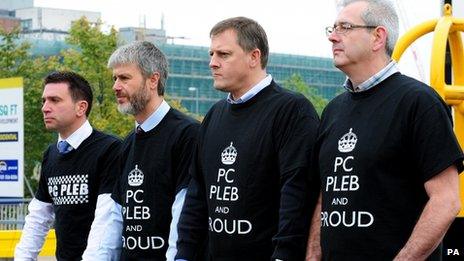Police Federation: Pulling it out of the past
- Published
- comments

Plebgate: Just one of a number of controversies involving the Police Federation
Every year, there are two places where you will find a rowdy audience willing to boo and heckle. The first is the pantomime. The second is the Police Federation annual conference - as soon as a Home Secretary walks on stage.
Notwithstanding the fact that Theresa May didn't get jeered this year (it was such a surprise, some newspapers thought the lack of boos to be newsworthy), the expectation of such a performance only serves to confirm to the Police Federation's critics that it is a dinosaur-like organisation stuck in the dark ages of industrial relations.
Now a major report, external - commissioned by the federation's new leadership - has found the organisation wanting from top to bottom - just as critics have long suspected.
The report, headed by former Home Office Permanent Secretary Sir David Normington, is withering in its criticism.
His panel concluded that the federation is not only suffering a worrying loss of internal confidence and competence - but it has also lost influence or the ability to speak with one voice.
The federation was born in the wake of walk-outs by police officers in 1918.
Parliament banned the police from striking - but ministers recognised there still needed to be some way of hearing the voice of ordinary officers.
The Police Federation of England and Wales was created to fill that role - and it was given a degree of state funding and largely guaranteed access to ministers.
So for around a century, the federation has been at the centre of police industrial relations - and it has been able to present itself to ministers as an extremely powerful body, backed by tens of thousands of members.
The problem is that two recent events - police reform and "plebgate" - have revealed how divided and weak the federation has actually become.
Personal attacks
The cracks began to emerge as the coalition pushed through a series of radical changes to policing: cuts to numbers, wide-ranging reforms to pay and conditions for those left behind, and the introduction of the controversial police and crime commissioners.
The Fed's stance was to oppose and fight. There was an explosion of outrage from some officers on social media, including personal attacks against the twin architects of the reforms, Theresa May and Tom Winsor.
The Fed lost. Completely.
Today, Mrs May has implemented or is implementing most of the package - and she has even managed to consolidate it by appointing Mr Winsor as the chief inspector of constabulary.
Then came "plebgate" - an affair that is far from over. One officer has been convicted after lying about the Downing Street incident. Others are facing either independent investigation or internal disciplinary hearings.
The federation has played an important role in this saga and some branch figures orchestrated personal social media campaigns over the issue.
Yet, again, it appears to have backfired; A BBC News poll found that in the wake of Plebgate more than a quarter of people were less likely to trust the police than before.
Impartiality and Integrity
The Normington report does not pull any punches, saying personal campaigns, including against federation members who held a different point of view, risked the police's reputation for "impartiality and integrity".
"If the federation wants to be respected and listened to in the future, this has to stop," says the report.
Steve Williams, the new chairman who commissioned the report, has his work cut out.
Some of the branches don't even tell him how much money they have in the bank.
So while Sir David's proposals require a complete rethink of the organisation - it is going to be a very tough road ahead.
But perhaps most importantly, Sir David warns that no matter how successful the organisation is at reorganising its internal structures, it must face down a factionalist "powerful minority" who are more interested in political infighting and point-scoring than what's good for the country.
"In terms of ethics, it's not what we want from our police officers," he says.